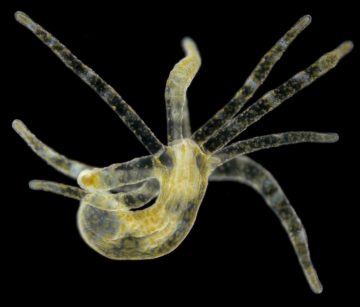Veronique Greenwood in Quanta:
 The hydra is a simple creature. Less than half an inch long, its tubular body has a foot at one end and a mouth at the other. The foot clings to a surface underwater — a plant or a rock, perhaps — and the mouth, ringed with tentacles, ensnares passing water fleas. It does not have a brain, or even much of a nervous system.
The hydra is a simple creature. Less than half an inch long, its tubular body has a foot at one end and a mouth at the other. The foot clings to a surface underwater — a plant or a rock, perhaps — and the mouth, ringed with tentacles, ensnares passing water fleas. It does not have a brain, or even much of a nervous system.
And yet, new research shows, it sleeps. Studies by a team in South Korea and Japan showed that the hydra periodically drops into a rest state that meets the essential criteria for sleep.
On the face of it, that might seem improbable. For more than a century, researchers who study sleep have looked for its purpose and structure in the brain. They have explored sleep’s connections to memory and learning. They have numbered the neural circuits that push us down into oblivious slumber and pull us back out of it. They have recorded the telltale changes in brain waves that mark our passage through different stages of sleep and tried to understand what drives them. Mountains of research and people’s daily experience attest to human sleep’s connection to the brain.
But a counterpoint to this brain-centric view of sleep has emerged.
More here.
